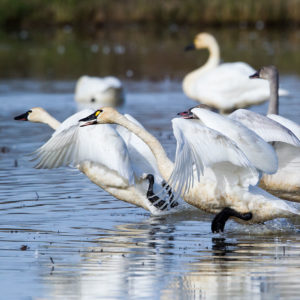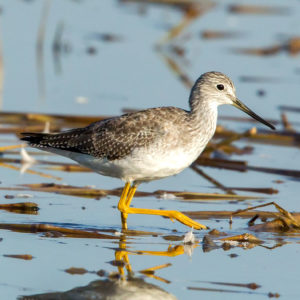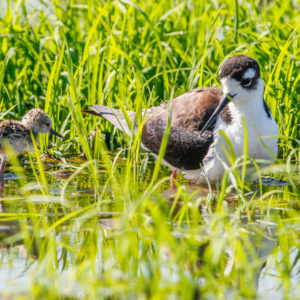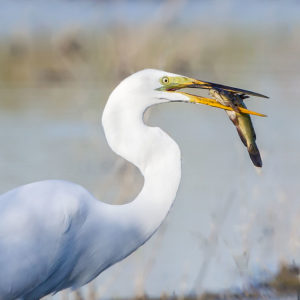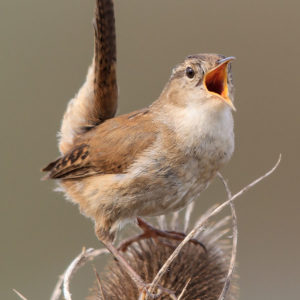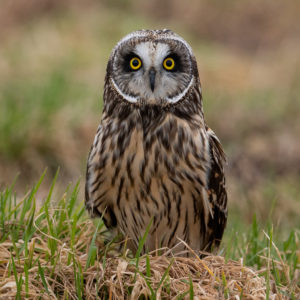Mission Statement
Enhance the ecological value of California rice fields to help sustain the millions of waterbirds and other wildlife in the Pacific Flyway for future generations.
Advancing the quality of Sacramento Waterbird habitats
The California Ricelands Waterbird Foundation (“Foundation”) is a partnership between rice farmers and waterbird conservation groups for the long-term preservation of habitat for waterbirds in California’s Sacramento Valley.
This close relationship between the Foundation and the California Rice Commission brings a significant number of California rice growers to the table who are willing to alter their farming practices for the benefit of waterbirds. In addition, cooperative contributions from many waterbird conservation partners bring forward key technical expertise which ensures that waterbird habitat enhancement projects will be successfully deployed.
Through over a decade of work to develop and refine beneficial waterbird practices, the Foundation now has a working model for receiving private and public financial contributions and efficiently putting these dollars right onto the ground in real, quantifiable waterbird conservation programs.
What We Do
The Foundation is uniquely positioned
The Foundation is uniquely positioned, through its direct relationships with California rice growers and its partnerships with highly-respected waterbird conservation groups, to cost-effectively deploy our donors’ tax-deductible contributions directly into conservation efforts on the ground. We execute this with a long-standing history of cooperatively bringing rice growers and wildlife conservation experts together with a collective goal of implementing waterbird conservation objectives on private lands.
The Result
- Directly manage contracts with the growers and landowners to perform the conservation practices.
- Utilize annual contracts that allow us to prioritize projects based upon changing environmental conditions and concerns.
- Use current science-based data to identify the most critical areas and time periods to implement projects.
- Execute compliance monitoring to ensure the habitat practices are prepared and managed correctly.
- Monitor bird use to assess efficacy of practices and inform adaptive improvements.
- Communicate, through many social media outlets about the positive outcomes from our donors’ contributions to wildlife.
WORKING RICELAND HABITATS
An Important wetland surrogate for birds
Wildlife use of cultivated ricelands
The Board

PAUL BUTTNER
Chairman & Executive Director
Paul Buttner has served as Manager of Environmental Affairs at the California Rice Commission since 2001 leading wildlife conservation. He has nearly 30 years of environmental resources management and public policy experience. He previously worked at Resource Management International and Cargill. Mr. Buttner holds a bachelor’s degree in Environmental Science from the University of California, Berkeley.
Paul Buttner has served as Manager of Environmental Affairs at the California Rice Commission since 2001 leading wildlife conservation. He has nearly 30 years of environmental resources management and public policy experience. He previously worked at Resource Management International and Cargill. Mr. Buttner holds a bachelor’s degree in Environmental Science from the University of California, Berkeley.

MIKE DEWIT
Director
Mike DeWit is a second generation California rice farmer with a strong history of implementing innovative conservation practices for waterbirds including continuous enrollment in the Waterbird Habitat Enhancement and BirdReturns Programs. He has served on the California Rice Commission since 2001 including two committees that focus on rice waterbird conservation programs. Mr. DeWit graduated from Cal Poly with a degree in Crop Science.
Mike DeWit is a second-generation California rice farmer with a strong history of implementing innovative conservation practices for waterbirds including continuous enrollment in the Waterbird Habitat Enhancement and BirdReturns Programs. He has served on the California Rice Commission since 2001 including two committees that focus on rice waterbird conservation programs. Mr. DeWit graduated from Cal Poly with a degree in Crop Science.

Xerónimo Castañeda
Director
Xerónimo Castañeda has been with Audubon for over six years where he has held several positions and is currently the Working Lands Program Director for Audubon California. Xerónimo’s work focuses on scaling the impact of alternative land management practices on wetlands and crop lands to provide multiple benefits for people, birds, and the environment. In addition, he leads Audubon’s Tricolored Blackbird conservation program and works across sectors to minimize negative impacts of SGMA implementation to birds and communities. Prior to this he spent several years as a field biologist working on projects across the United States. He holds a Master’s in Natural Resource Management with an emphasis in wildlife from Humboldt State University, is a 2020 Delta Leadership and 2021 Water Solutions Network program participant.
Xerónimo Castañeda has been with Audubon for over six years where he has held several positions and is currently the Working Lands Program Director for Audubon California. Xerónimo’s work focuses on scaling the impact of alternative land management practices on wetlands and crop lands to provide multiple benefits for people, birds, and the environment. In addition, he leads Audubon’s Tricolored Blackbird conservation program and works across sectors to minimize negative impacts of SGMA implementation to birds and communities. Prior to this he spent several years as a field biologist working on projects across the United States. He holds a Master’s in Natural Resource Management with an emphasis in wildlife from Humboldt State University, is a 2020 Delta Leadership and 2021 Water Solutions Network program participant.

MARK BIDDLECOMB
Director
Mark Biddlecomb, retired as the Director of Operations for the Western Region for Ducks Unlimited, Inc. (DU) November of 2020 after more than 25 years with the organization. Initially, Mark restored wetlands and associated upland habitat throughout the Intermountain West then took over responsibility for program delivery in four western states.
Mark became the Director of Operations in 2010 and has focused his conservation leadership on stewarding the development of all conservation programs in the nine states of DU’s Western Region: California, Oregon, Washington, Idaho, Utah, Nevada, Arizona, Hawaii and Alaska. Prior to joining DU, Mark was a biologist with the Bureau of Land Management in Nevada. He holds a B.S. in Wildlife Management from Utah State University and a M.S. in Wildlife Management from the University of Alaska Fairbanks.
Mark is now working as a consultant to help expand DU’s influence in the Ecosystem Services arena. Working with farmers, ranchers and corporations to become more sustainable while benefiting wildlife is something Mark has long believed is of utmost importance for people and wildlife alike. Serving on the board of the California Ricelands Waterbird Foundation aligns perfectly with this ideal.
Mark Biddlecomb, currently the Director of Operations for the Western Region for Ducks Unlimited, Inc. (DU), has been with DU for more than 20 years. Initially, Mark restored wetlands and associated upland habitat throughout the Intermountain West then took over responsibility for program delivery in four western states.
Mark became the Director of Operations in 2010 and has focused his conservation leadership on stewarding the development of all conservation programs in the nine states of DU’s Western Region: California, Oregon, Washington, Idaho, Utah, Nevada, Arizona, Hawaii and Alaska. Prior to joining DU, Mark was a biologist with the Bureau of Land Management in Nevada. He holds a B.S. in Wildlife Management from Utah State University and a M.S. in Wildlife Management from the University of Alaska Fairbanks.

JOSH SHEPPARD
Secretary/Treasurer
Josh Sheppard is a fourth generation family farmer of 3,000 rice acres. He has served on the California Rice Commission Board of Directors since 1998 as well as the two major committees that focus on rice waterbird conservation programs. He was elected to serve as Chair the Industry Affairs Committee in 2014 and is a graduate of the USA Rice Leadership Class of 2009. Josh is active on USA Rice Conservation and Regulatory Affairs Committees and is the current Vice Chairman of the USA Rice Council. He is a strong proponent of working lands conservation program and has participated in the Conservation Stewardship, Waterbird Habitat and BirdReturns Programs. Mr. Sheppard graduated from Cal Poly in 1997 with degrees in Agribusiness and water science.
Josh Sheppard is a fourth generation family farmer of 3,000 rice acres. He has served on the California Rice Commission Board of Directors since 1998 as well as the two major committees that focus on rice waterbird conservation programs. He was elected to serve as Chair the Industry Affairs Committee in 2014 and is a graduate of the USA Rice Leadership Class of 2009. Josh is active on USA Rice Conservation and Regulatory Affairs Committees and is the current Vice Chairman of the USA Rice Council. He is a strong proponent of working lands conservation program and has participated in the Conservation Stewardship, Waterbird Habitat and BirdReturns Programs. Mr. Sheppard graduated from Cal Poly in 1997 with degrees in Agribusiness and water science.





